FROM JERUSALEM NICAEA
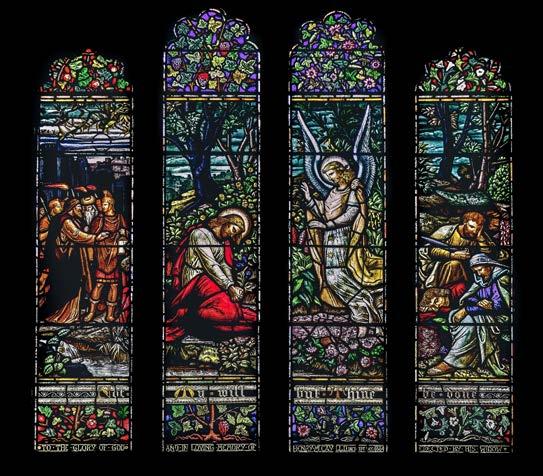


The International Christian Embassy Jerusalem was established in1980 in recognition of the biblical significance of all of Jerusalem and its unique connection to the Jewish people. Today the ICEJ represents millions of Christians, churches, and denominations to the nation and people of Israel. We recognize in the restoration of Israel the faithfulness of God to keep His ancient covenant with the Jewish people. Our main objectives are:
• To stand with Israel in support and friendship
• To equip and teach the worldwide church regarding God’s purposes with Israel and the nations of the Middle East
• To be an active voice of reconciliation between Jews, Christians, and Arabs, and to support the churches and congregations in the Holy Land
From its head offices in Jerusalem, the ICEJ reaches out into more than 170 countries worldwide, with branch offices in over 90 nations.
Our vision is:
• To reach every segment of Israel’s society with a Christian testimony of comfort and love
• To reach and actively represent to Israel the support of denominations, churches, and believers from every nation on Earth
The Christian Embassy is a non-denominational faith-based ministry supported by the voluntary contributions of our partners and friends across the globe. We invite you to join with us as we minister to Israel and the Jewish people worldwide by donating to the ongoing work and witness of the ICEJ.
Dear Friends,
ICEJ President Dr. Juergen Buehler
USA President Susan Michael
VP International Affairs Dr. Mojmir Kallus
VP Finance David van der Walt
USA Director of Finance Barry R. Denison
Senior VP & International Spokesman David Parsons
USA Director of Communications Shannon Bennett
VP AID & Aliyah Nicole Yoder
Managing Editor/Publications Director Laurina Driesse
USA Managing Editor Karen Engle
Staff Writer Anastasiya Gooding
Graphic Design/Illustrators Ryan Tsuen, Nancy Schimp
Photography Adobe Stock, Adobe Firefly, Shutterstock, GPO AP, Flash90, Yossi Zeilger-JAFI, iStock, K. Mitch Hodge-UnSplash, Operation Lifeshield,Wikimedia, Wordpress, ICEJ Staff, and Branches
The New King James Bible is used for all Bible references unless otherwise noted.
Word From Jerusalem is published by the International Christian Embassy Jerusalem. Reproduction in whole or in part without written permission is prohibited. Word From Jerusalem has no subscription price and is supported through contributions worldwide. The ICEJ USA Branch is a 501(c)(3) non-profit organization with offices in Tennessee, Florida, and Washington, DC. All gifts to this ministry are tax-deductible according to United States law.

Israel is facing a progressively difficult and complicated situation. Hamas is remaining steadfast in its refusal to disarm, leaving Israel determined to complete its mission to neutralize the threat and restore security. While the Israeli government is focused on securing the last strongholds in Gaza, including Gaza City and the Mosai region, and bringing home all the hostages—alive and deceased—public opinion and support for Israel have become increasingly divided worldwide. Even some former allies are expressing doubts or criticism, problematizing the path forward.
But God. We know He is still on the throne, and He will fight fiercely for the nation He set apart to bring glory to His name.
We see evidence of His faithfulness as Aliyah continues despite what Israel is experiencing. Isaiah’s prophetic words are coming to pass before our very eyes—God is “[gathering] together the dispersed of Judah from the four corners of the earth” (Isaiah 11:12). In this issue of Word From Jerusalem, you’ll read two articles about groups that recently arrived in Israel from France and Ethiopia. I encourage you to read them.
I also invite you to read this month’s powerful teaching article by David Parsons, ICEJ’s Senior Vice President & Spokesman, exploring the Nicaea Council and the divinity of Jesus—especially as we observe this year the 1700year anniversary of when Nicaea convened.
Lastly, as summer closes, all of us at the ICEJ are looking ahead with anticipation to the Feast of Tabernacles celebration from October 6–13. This year’s Feast holds deep significance as Israel continues to navigate the aftermath of a prolonged and intense conflict in the region. We are committed to bringing together as many Christians as possible for a solidarity and support tour, standing with Israel during this critical time of recovery and renewal. Now more than ever, Israel needs our friendship, prayers, and presence. It’s not too late to sign up to join us online at: www.icejusa.org/feasttour. We hope you join us!
May the Lord bless you from Zion,

Dr. Juergen Buehler
ICEJ President
COVER PHOTO: Stained glass windows in St. Columb's Cathedral, Londonderry, Northern Ireland, depicting Jesus, His disciples, and an angel at Gethsemane as the Roman soldiers arrive to arrest him (credit: K. Mitch Hodge/ Unsplash)

www.icejusa.org/wfj
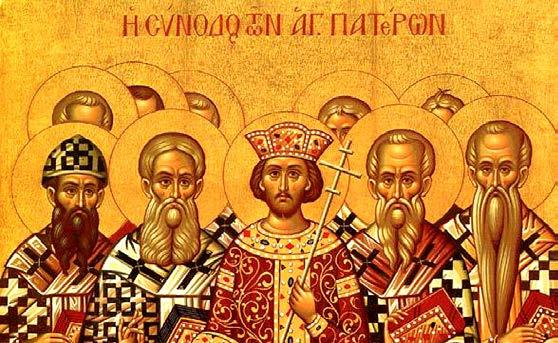
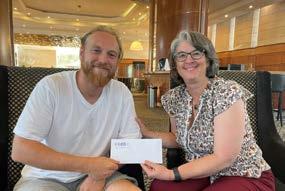
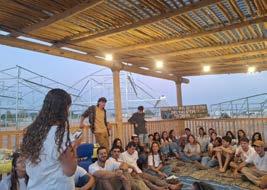
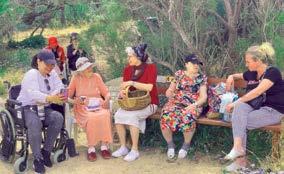

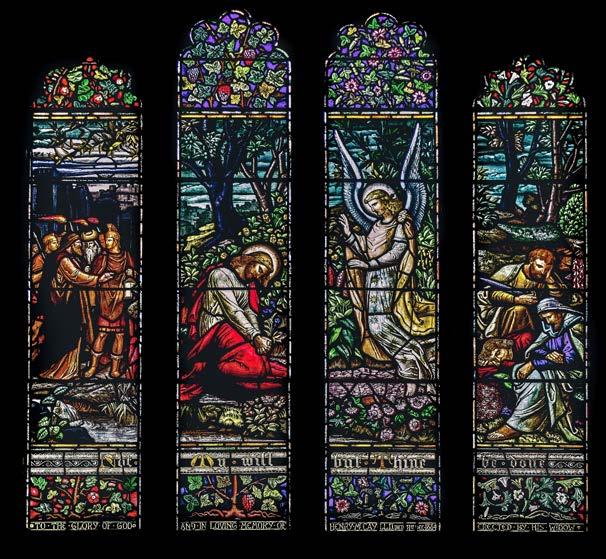
BY DAVID PARSONS, ICEJ SENIOR VICE PRESIDENT & SPOKESMAN

As Christians observe the 1700-year anniversary of the Council of Nicaea in AD 325, the controversy over the nature of Jesus resolved at that important gathering has
resurfaced in modern times—both within Christianity and in relation to other religions.
The Council of Nicaea was convened to settle two main disputes plaguing the early church in those days: Was Jesus human or divine? And what is the proper date for Christians to celebrate Easter?
It is generally agreed among scholars and church historians that the bishops at Nicaea made a landmark decision that united orthodox Christianity around the dual nature of Jesus as both fully human and fully divine, and this decision has served the church well over the centuries since.
The problem in those days was the teaching that Jesus was not human but some sort of spirit or angelic being. These views were firmly dismissed with the adoption of the concept of the “Trinity,” first expounded by Tertullian, and its essential truth that Jesus is God incarnate. The alternatives were rejected because each failed to do justice to the person of Jesus and his atoning sacrifice.
This doctrinal decree on the dual nature of Jesus held for many centuries, but today similar teachings that question the triune Godhead are reemerging. Even some Evangelicals are being influenced by the work of liberal Christian scholars over recent decades who insist that it was Paul who later deified Jesus, likely under the influence of Hellenism.
Meanwhile, many Christians who support Israel and explore the Hebraic roots of their faith and have started engaging with Jewish friends and rabbis eventually run into certain theological “obstacles,” such as the Torah’s ban on idolatry. At some point, the question arises as to whether, in worshiping Jesus, we are violating the core tenet of Rabbinic Judaism—the Shema, from Deuteronomy 6:4: “Hear O Israel, the LORD is our God, the LORD is one.”
Some Christians have responded by attempting to “water down” the divinity of Jesus, perhaps in part to make Him more palatable to Jewish people. But in the process, they actually wind up leaving monotheism. By taking Jesus outside the oneness (in Hebrew, echad) of God and yet still revering Him, they end up with one God and perhaps a semi-deity. In doing so, they devalue the uniqueness of the person of Jesus and compromise His atoning work on the cross. Sadly, some are even departing from the faith.
The New Testament View on the Shema
To address these questions, we can begin by establishing that the New Testament repeatedly affirms the Shema, including
Jesus Himself in Mark 12:29 and Paul in 1 Corinthians 8:4 (see also James 2:19). Thus it is clear that Jesus and His early Jewish followers adhered to the exclusive monotheism of Judaism in the Second Temple era. And yet, they ascribed divine identity to the man Jesus, describing Him as “one” with the Father and even attributing the acts of creation to Him.
In fact, the apostles were quite bold in declaring that the mystery of God’s nature, which had been hidden in ages past, was revealed to them in the person of Jesus (see Ephesians 3:8–12; Colossians 1:26–27). They viewed this as a matter of progressive revelation in Scripture and in redemptive history, that the one true and invisible Creator God actually manifested in various ways in the accounts of the Hebrew Bible, until He came in human form at the incarnation.
Now the apostle Paul does concede that the nature of the Godhead is a great mystery: “And without controversy great is the mystery of godliness: God was manifested in the flesh” (1 Timothy 3:16).
Yet elsewhere, we see Jesus described as “being in the very nature of God” (Philippians 2:5–11) and the “express image of His person” (Hebrews 1:3).
In the Gospels, John begins with a theological statement: “In the beginning was the Word, and the Word was with God and the Word was God . . . and the Word became flesh and dwelt among us” (1:1 and 14)
Jesus Himself declared “I and My Father are one” (John 10:30).
We also have Thomas resolving his doubts and calling the resurrected Jesus “my Lord and my God”—a profession Jesus does not rebuke but affirms (John 20:28).
Thus, those who claim it was Paul who deified Jesus under the influence of Greek mythology are simply wrong. In fact, we see Paul in Acts 14 having a direct encounter with belief in the pantheon of Greek gods in the city of Lystra and tearing his clothes in vehemently rejecting such idolatry.
In 1 Corinthians 8:4, Paul also clearly states that “there is no other God but one” and again in verse 6, “yet for us there is one God the Father . . . and one Lord Jesus Christ.”]
Paul’s exalted view of Jesus—as not only the Son of God but also God in human form—was shared by the earliest apostles. These first Jewish followers of Jesus believed it was acceptable to honor him because they saw him as fully included within the oneness (echad) of God. The exclusive attributes of Elohim, such as creation and kingship, were extended to Jesus as someone within the very identity of God Himself. For instance, Paul described Jesus this way to the believers in Colossae:

He is the image of the invisible God, the firstborn over all creation. For by Him all things were created that are in heaven and that are on earth, visible and invisible, whether thrones or dominions or principalities or powers. All things were created through Him and for Him. (Colossians 1:15–16)
But on what scriptural basis from the Old Testament could they do this?
Monotheism in Scripture
Bible scholars have noted three types of monotheism presented in Scripture:
Creational monotheism – God made all things, and for that reason alone, He deserves our undivided worship.
Covenantal monotheism – God is good and merciful and engaged with His world, entering a unique covenant relationship with the people of Israel.
Eschatological monotheism – God revealed His character (personality) to ancient Israel, but the divine nature and essence of His being is a matter of progressive revelation; the Bible assures us there is more unveiling of this incredible God to come.
Although Rabbinic Judaism would later alter its view in response to Christian teachings, the echad of the Shema was originally understood as meaning unity, not singularity—an indivisible composite or the compound “one.”
In the Shema, two distinct names are used: Elohim for the invisible Creator God of Genesis chapter 1, and Adonai (in Hebrew, YHVH) for the exalted being that Israel was visibly encountering at Sinai. For instance, Moses and the 70 elders “saw the God of Israel” and even ate and drank with Him in Exodus 24:9–11. Abraham had also conversed and dined with Adonai in Genesis 18. These visible appearances and manifestations of a divine being named Adonai—sometimes described as “the Angel of the Lord” or “the Angel of His Presence”—occurred often in the Old Testament. Thus, the Shema was meant to instruct Israel that Elohim and Adonai are one-and-the-same, with the focus being on identifying the one true God and not necessarily defining His “substance.”
The late Hebraic roots teacher Dr. Dwight Pryor pointed out that this understanding of “one” in the Shema derives from the first use of the word echad in the Bible. In Genesis 1:5, the evening and the morning combine to equal “one day” (most Bibles translate it less accurately as “the first day”). Then in Genesis 2:24, we are told that man and wife shall become “one flesh.” These are examples of the use of the compound one, not the singular one.
The Judaism of the Second Temple era was fairly pluralistic, accepting or tolerating a wide variety of views even on the nature of God. Some three decades ago, rabbinic scholar Alan Segal produced a major work on the idea of “Two Powers in Heaven” in Jewish thought. This concept of two divine powers refers to an invisible Yahweh and a visible one, who both show up at times in the same passages of Hebrew Scripture, such as Exodus 23:20–25 and Daniel 7:9ff. Segal traced the roots of this idea back to around 200 BC and argued that it was not deemed heretical in Jewish theology until the second century AD—when they adopted instead a strict form of monotheism largely in response to the claims of Christianity concerning Jesus.
Christian scholar Dr. Michael Heiser notes that this helps explain why the early Jewish followers of Jesus could simultaneously worship the God of Israel and Jesus—and yet refuse to acknowledge any other god. For them, Jesus was the incarnate second Yahweh
Thus, God is an indivisible unity of all that He is, was, and will be, standing outside Creation and wholly unique from it, yet also manifesting Himself within Creation in a human-like form and eventually in the person of Jesus.
“None Besides Me”
The prophet Isaiah, especially in chapters 43–45, brings out more fully the exclusivity of the God we worship: “There is none besides Me.” But note that where Isaiah 45:23 says that “every knee shall bow” to this God, Paul in Philippians 2 attributes this exceptional place to Jesus.
The risen Lord Jesus can be worshiped alongside Elohim only if He remains within the oneness of God—that is, wholly divine. And the apostles were persuaded that their Scriptures allowed for this, even though they also knew that no image of God could or should be made, as it could never properly reflect God. However,
Jesus is the perfect “brightness of His glory and express image of His person” (Hebrews 1:3), and therefore He embodies no distortion of His form; on the contrary, he is the only begotten (one-of-a-kind) Son of God (John 1:18).
Daniel
The clincher for me is found in the book of Daniel. The model of a “militant” monotheist, Daniel risked the lions’ den rather than pray to another god. His three Hebrew friends preferred a blazing furnace to bowing before any image. And yet in chapter seven, Daniel has an astounding vision of “one like the Son of Man, coming with the clouds of heaven! He came to the Ancient of Days, and they brought Him near before Him. Then to Him was given dominion and glory and a kingdom, that all peoples, nations and languages should serve Him” (7:14).
Many translations use the word “worship” for “serve” in this verse. The original word p’lach in Aramaic corresponds to the Hebrew word meaning “to worship, serve, or cleave to God” and is used as such 10 times in the Old Testament. Further, “coming with the clouds of heaven” is a sign of divinity used only in reference to God throughout Scripture.
So here we have the faithful monotheist Daniel describing someone with a human appearance approaching the Almighty and receiving a kingdom so that all nations are to serve and worship him. Yet nowhere does Daniel speak disapprovingly of this vision or distance himself from it! So, either this messianic figure had to be considered as in union with God or even Daniel has flirted with idolatry.
Then, when Caiaphas asked Jesus whether He was indeed the Messiah, Jesus answered, drawing from Daniel 7: “It is as you said. Nevertheless, I say to you, hereafter you will see the Son
of Man sitting at the right hand of the Power, and coming on the clouds of heaven” (Matthew 26:64). That is, Jesus ascribed to himself two exclusive divine attributes of sitting at God’s right hand and of coming on the clouds of heaven. So much for Paul being the first to deify Jesus!
Conclusion
So Christians have no reason to ever compromise on our concept of the Triune God—of the promised Messiah being not only “Son of God” but God Himself. In holding to this doctrine, we stand upon a legitimate interpretation of the Hebrew Scriptures. Through Christ, we are invited into an eternal loving relationship self-contained within the three persons of the Godhead, who are distinct and yet inseparable. And within that secure place, we can confidently worship Jesus with abandon.
Allow me to finish with two key points.
First, we know that God is ever dwelling in “unapproachable light, whom no man has seen or can see” (1 Timothy 6:1–-16), and the great mystery of the Godhead can be simply explained as follows: Jesus is God in an approachable form!
Second, God is jealous over His Son! He never wanted us to worship any other part of Creation, as that is reserved solely for Jesus.

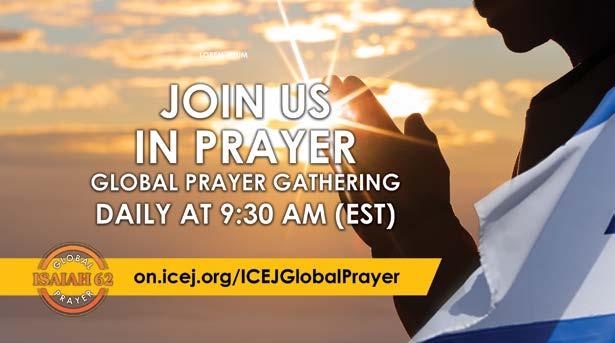

ICEJ USA Shomer Society member Lois Grove, who loves knitting and giving away her creations, holding an afghan she knitted for a staff member at her independent living community
ICEJ USA donor Lois Grove and her husband became aware of the International Christian Embassy Jerusalem after their first trip to Israel in April 1991. At the time, they lived in the Minneapolis/St. Paul area of Minnesota, and friends invited them to join them on a trip to Israel that they signed up for. The trip cost $1100.
Lois describes that first visit to Israel as completely and totally lifechanging. “I couldn't believe that we were in Israel and were walking where Jesus walked. It brought the Bible alive—and still does when I read it.” The experience left such a deep impression that she and her husband returned three more times. “I have written detailed notes on each of our four trips,” she says.
Each journey was sponsored by a different organization and offered a unique focus. On their second trip, they explored Petra. Their third trip centered on visits to military bases. Their final trip was in August 2012, which involved visiting hospitals. “We brought gifts to new babies born in the B'nai Zion Hospital in Haifa, and we visited Orphanage Bet Elazraki.” Lois recalls being overwhelmed hearing the stories of the children there.
“The people of Israel are God's chosen people. I pray for Israel at least two times a day—not only for the peace of Jerusalem but also for the security of Israel,” says Lois.
With such a love for Israel and God’s people, it’s no surprise that Lois and her late husband are members of the Shomer Society (“Keeper of Israel”), designating part of their estate to the ICEJ. “We finalized our will and trust several years ago and then updated it a few years before he died in 2019. We want our funds to go to an organization that helps the Jewish people and ministers to them, and I know of no other organization better than the ICEJ,” she said. “I am blessed by the ICEJ and all that the organization does for the people of Israel.”
Learn more about the ICEJ Shomer Society or become a member today at: www.icejusa.org/shomer

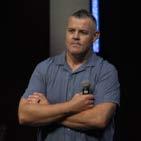
“Growing up, I often heard about the importance of standing with Israel, but rarely was it explained why or what that actually involved. One weekend with ICEJ, and now I clearly see that I owe a deep debt of gratitude to the Jewish people for two profound reasons: the Word of God and Jesus. To stand with Israel is to love the people of Israel, in word and action.”
—Pastor
Josh Smith, Grow Point Church, Amherst, OH

"I'm so thankful to the ICEJ team for taking the time to share with our group. They really helped inspire me to see God's heart for Israel through their insightful presentations."
—Tom Nolan, COO TCT Television Network

If you’ve ever been on an ICEJ USA tour—or are planning to join one—you’ve already been blessed by the incredible work of Kelsey Olguin, our Tours & Outreach Manager. Kelsey is the quiet force who makes these life-changing trips to Israel run seamlessly, handling countless details behind the scenes so you can simply enjoy the journey.
A former wedding videoographer, she has served with the ICEJ for 10 years, bringing creativity, precision, and a heart for people to everything she does. Kelsey first joined the ICEJ in Jerusalem from 2008–09, working in the graphics and video department alongside her late husband, Jon.
Continuing a Legacy of Love for Israel
Nathan Dupree, along with his lovely new bride, Maria, have a heart for Israel that runs deep. More than 15 years ago, Nathan began supporting the International Christian Embassy Jerusalem, a passion sparked by his mother, who instilled in him a lifelong love for the Jewish people and the Land. Though his mother has since passed, Nathan honors her legacy through his continued dedication and generosity—a commitment that has earned him the Watchman of Zion partner level.

Now living in New York, Nathan and Maria are shining examples of how one family’s faithfulness can inspire others. We are the godly woman who first planted the seeds of love for Israel in Nathan’s heart.
LEARN MORE ABOUT THE WATCHMAN OF ZION AND OTHER PARTNERSHIP LEVELS AT: give.icejusa.org/donate/begin-your-icej-partnership
“It is truly a joy to know that the gifts God has given me are being used in His kingdom,” says Kelsey. “It’s amazing to be a small part of helping people get to experience Israel in person and seeing so many of their lives transformed as the Bible comes to life before them. I pray for a lifechanging impact for them personally, for the Jewish people, and for the kingdom of God.”
For Kelsey, serving with the ICEJ is deeply personal— rooted in a profound awareness of how the Jewish people have blessed her own life. “So many of the blessings I cherish, including the gift of eternal life through Jesus, have come through God’s call on them and His purposes for them,” she shared. “They have carried the calling and the burden of bringing redemption to the world and have paid an immense price for it. I have been grafted into the promises God gave to and through them, and my heart overflows with gratitude and a longing to see their complete restoration in Jesus.”
Kelsey lives in middle Tennessee with her husband, Esteban, and their two children, Harper, who is 6, and EJ, who is 17. When she is not planning ICEJ USA tours or helping to manage the growing number of outreach events for pastors and churches, Kelsey enjoys spending time with her family. She also loves home improvement projects, landscape gardening, strategy games, puzzles, biking, and hiking.
BY NATIVIA BUEHLER ICEJ AID ADMINISTRATOR
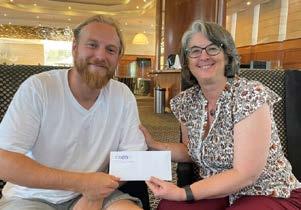
Since the first wave of Iranian missile strikes on Israel, the ICEJ has been actively supporting families forced to flee under rocket fire. One of the hardest-hit areas was Bat Yam. When ICEJ staff visited the neighborhood in the aftermath of the attack, we encountered scenes unlike anything we had witnessed before in Israel. What was once a vibrant, bustling community now lay in ruins—strewn with shattered glass, twisted metal, and the remnants of people’s lives.
Among those affected is a young immigrant couple, Gennady and Ksenia, who now find themselves displaced in Jerusalem, far from the apartment they once called home and facing the challenge of starting over once again.
Six months ago, the couple arrived in Israel from a remote corner of the former Soviet republics with their two young sons. Gennady, an engineer, was about to start a new job in Petah Tikvah when the war with Iran broke out, upending everything.
Their apartment in Bat Yam was located directly across from where a rocket struck. The explosion blew out their windows and shook the building. Emergency officials initially declared the structure unsafe. Later, after quick repairs, it was deemed livable, but Gennady, assessing it with an engineer’s eye, disagreed. “I love this country,” he said, “but I will not live in that building, especially not with my family.”
them. Ksenia, pregnant with their third child, a little girl due in October, was also caring for their two- and four-year-old sons. On the day they fled, she didn’t hesitate, even when told they could take nothing with them—not even a stroller. Everyone cried, except Ksenia. Through it all, Gennady said she was strong. But in the days that followed, the shock took hold.
Ksenia and Gennady refuse to go back to Bat Yam and hope to find an apartment in Petah Tikvah near Gennady’s new job. But their financial cushion is gone, and they do not have the funds needed for a down payment and rent. Their previous landlord is withholding their deposit, saying he will return it only once the government reimburses him, a process that could take months. Legal options exist, but they are out of reach for now.
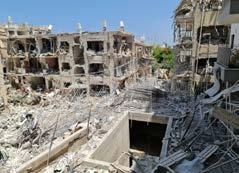
When the Christian Embassy heard about the family’s situation, we quickly stepped in to help. We provided store vouchers for essential supplies and are helping with expenses toward a new apartment, a much-needed boost as they rebuild their lives.
Gennady told us, “This will help us so much—thank you.” When asked if he had a message for ICEJ’s supporters around the world, he said: “You are the light of the world. People don’t have hope. You give them the hope that’s in your heart.”
With damage all around them and safety no longer guaranteed, the family packed what little had not been ruined, moved it into storage, and evacuated to a hotel in Jerusalem, where they stayed for a few weeks.
But the strain quickly mounted. Their savings—already depleted from the Aliyah process—were soon gone, credit card debt was climbing, and the weight of displacement pressed heavily on
The ICEJ is committed to standing with families like Gennady and Ksenia, offering practical help, encouragement, and the assurance they are not alone. Your support for our Israel in Crisis fund provides critical grants that help Israelis rebuild after losing
On October 7, 2023, Kibbutz Be’eri suffered one of the deadliest terror attacks in Israel’s history. Over 130 residents were killed or kidnapped— including 51 elderly—and more than 120 homes and 13 public buildings were destroyed. Among them was the youth activity center, once a safe and joyful space for elementary school children.
In April 2025, construction began on a new, secure youth center in Kibbutz Be’eri—designed as a vibrant space for learning, healing, and summer programs for returning families. More than a building, it will serve as a lifeline for a generation of traumatized Israeli children. Completion is expected by October 2026.
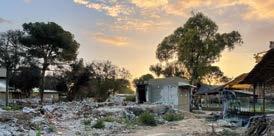

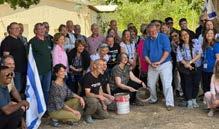

By giving to this urgent rebuilding effort, you are:
• Helping Israeli children heal from trauma
• Supporting a war-torn community through education and emotional recovery
• Fulfilling Isaiah 60:10: “Foreigners will rebuild your walls”
pour cement ... HELP US REBUILD!
Your gift declares to Israel: “You are not alone—American Christians are standing with you.”
Donate today at: www.icejusa.org/returnandrebuild

BY NATIVIA BUEHLER, ICEJ AID ADMINISTRATOR
Today is a big day for us,” said Asaf, founder of an innovative Israeli agro-tech school near the Gaza border. “Thank God, work on our new greenhouse has begun with full momentum.”
After months of delays, planning, and great anticipation, construction is finally underway on a new greenhouse classroom in Kibbutz Sde Nitzan in the Eshkol Regional Council. The project is made possible thanks to generous support from Christian donors through ICEJ Germany. Though the pace has been slower than hoped, on a recent visit, we saw that equipment has started arriving and foundations are being marked. Within a month, the large greenhouse classroom is expected to be fully completed and ready to welcome its first group of students.
“We dreamed it would already be built,” said Asaf, who has been leading the farming side of the project. “But the momentum is finally here. We’ll begin the coverings soon, then the interior installations.”
rebuilding something greater than themselves.”
The ceremony closed with everyone singing the Hebrew folk song “Al Kol Eleh,” by famous Israeli singer Naomi Shemer,” which says:

The greenhouse is part of a visionary new agro-tech high school being established in the Gaza border region, an area devastated by the October 7 invasion by Hamas and left critically short of agricultural workers. With 89 percent of local farms reporting negative impact and 19 percent shutting down entirely, the future of farming in the region looked grim. But now, a new generation is being trained to lead the long-term recovery.
This school, the first of its kind in the area, combines handson farming with advanced agricultural training and leadership development. Students learn everything from biotechnology and seed genetics to irrigation systems and entrepreneurship—all while gaining real-life experience in greenhouses and local fields. “These are historic times for Israel, and for the entire free world,” Asaf reflected. “They are complex days but filled with hope for the future.”
The greenhouse will serve as a live classroom, giving students a chance to work with soil, sensors, and sustainable systems in real time. But this is only Phase One. The next stage includes full classroom blocks and a dedicated learning center, essential for expanding the program.
The sense of mission behind this project was captured powerfully in a recent year-end ceremony. Beneath the open shelter overlooking the agro-tech campus, a mix of students, teachers, and local farmers gathered to mark the end of the new school’s pilot year. It was an emotional and deeply meaningful event.
Each person who spoke shared reflections on what it meant to pioneer such an initiative in a time and place of such national trauma. “There was a deep feeling of calling and humility,” one teacher said. “These students are not just learning—they are
Please do not uproot what’s been planted. Do not forget the hope. Return me, and I shall return. To the good land . . . Keep, O God, this home of mine, the garden and the wall. Protect it from sudden sorrow, from fear and from war. . . .
The words echoed across the fields, moving many to tears as they realized that even in a land scarred by tragedy, hope still springs. Thanks to our Christian donors, we also can hope and pray that the new crops being planted in these fields and greenhouses will
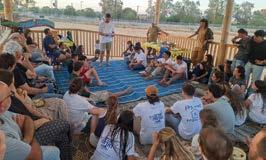
At the agro-tech school, students will gain advanced agricultural training and leadership development.
take root and remain for generations to come.
The school’s long-term vision includes developing an expanded campus—including more classrooms, a library and safe room, dormitories, dining facilities, and other essential infrastructure. Though the ICEJ has committed to building the new learning center, $210,000 more is needed to complete the classrooms. Give to the Israel in Crisis Fund today and help turn this vision into a reality.
Donate today at: give.icejusa.org/donate/israel-in-crisis-fund “Agro-Tech School”

BY YUDIT SETZ, ICEJ DEPUTY AID DIRECTOR
The ICEJ’s Home for Holocaust Survivors in Haifa has had a busy spring and early summer, filled with outings to interesting places. Recently, our residents were invited to the coastal village of Shavei Tzion for a day of relaxation and enjoyment. Early that morning, our residents and their caregivers boarded a bus and set out full of anticipation. Upon arrival, our hosts at the Beit El guesthouse greeted us warmly with coffee and cake.
Beit El is operated by Zedakah, a German Christian ministry that has sent volunteers to Israel since 1969 to serve at the guesthouse, which over the decades has welcomed thousands of Holocaust Survivors for free 10-day holiday respites. The dedicated staff and volunteers from Germany are motivated by the same calling as the Christian Embassy to “Comfort, comfort My people.” In fact, those words from Isiah 40:1 are inscribed on the wall of their dining hall.
After our coffee break, everyone explored the beautiful gardens or visited the nearby beach, just a few hundred meters away. The residents enjoyed the fresh sea breeze, stunning views, and peaceful surroundings.
loving care in the last years of their lives.
The story about Christians volunteering at the Beit El guesthouse and the nursing home left an impression on our residents, as it so mirrors our Haifa Home. “The history of this place deeply touched me,” said David. “I felt a strong connection, even though I am Jewish. These Christians gave so much to us, and despite our different faiths, we share the same father, Abraham. This was an experience I will never forget.”
After lunch, we thanked the Beit El team for the wonderful day and invited them to visit us at the Haifa Home. Mania, one of our residents, gifted them one of her digital artworks to express our gratitude.
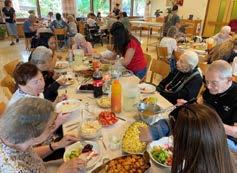
“When I sit at home all the time, I don’t feel well,” shared Sonia, who is usually homebound. “Here, I feel so much better. Seeing the sea instead of buildings gives me a sense of freedom and space.”
Before lunch, we gathered in the dining hall to watch a film about the founding of Zedakah and its ongoing mission. It told the story of how German Christians, answering God’s call in the 1960s, began this service of comfort despite many challenges. In 1984, Zedakah expanded its mission by opening Beit Eliezer, a nursing home in Maalot, where Holocaust Survivors receive
Survivors spent the afternoon relaxing in the gardens, playing games, strolling by the roses, or enjoying the beach. Some residents rested in special chairs, while others cherished the company of friends.
As the day came to an end, we boarded the bus for the trip back to Haifa, tired but joyful. For days afterward, our residents talked about this memorable trip.
Our ICEJ team at the Haifa Home also were very grateful for the opportunity to cooperate with Zedekah, as we both have the same heart and calling to bless and care for these precious Holocaust Survivors in their last years. And the caregivers also expressed their gratitude.
“What a beautiful day! We forgot we were working and just enjoyed the beach and each other,” said Reah. “We need days like this since we work 24/7. It gives us a chance to relax and have fun together."
Support the amazing work the ICEJ is doing to care for Holocaust Survivors in their remaining years. Donate today at: www.icejusa.org/holocaust-survivors
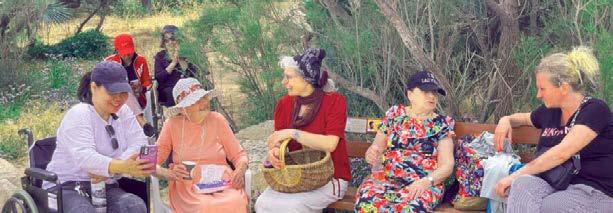
BY MARELINKE VAN DER RIET, ICEJ PUBLICATIONS ASSISTANT

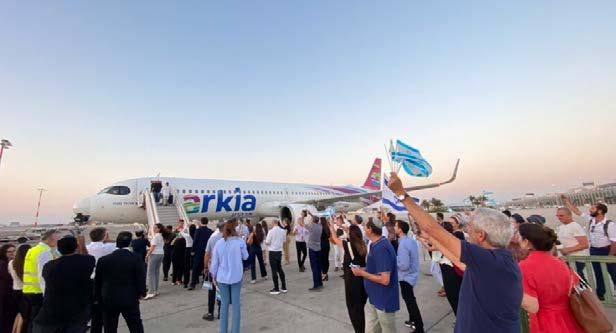
Across many continents and cultures, Jewish communities are finding their way home to Israel even amid the nation’s many challenges and hardships. From the broad, bustling avenues of Paris to the highlands of Ethiopia, the International Christian Embassy Jerusalem (ICEJ) continues to play a key role in facilitating Aliyah—the return of Jews to their ancestral homeland.
Recently, the ICEJ sponsored flights for 60 Jews to come home to Israel from France and 9 more from Ethiopia, reflecting our ongoing commitment to this prophetic movement. As their paths converge in Israel this summer, they offer a powerful reminder: the Land of Israel remains the true and enduring home for Jews from all around the world.
This July marked a significant moment in French Aliyah, as the Christian Embassy hit the 15th anniversary of our very first French flight in July 2010. That inaugural journey was inspired by a sharp rise in antisemitism following Operation Cast Lead in 2009. Since then, the ICEJ has supported thousands of Jewish immigrants, particularly in times of crisis.
As of July 2025, the ICEJ has helped 1,572 Jews make Aliyah so far this year from France, Russian-speaking countries, and Ethiopia—514 of them through direct flight sponsorships. Among them are 348 French Jews, bringing the total to 848 French Olim (newcomers) aided since the Hamas attack on October 7, 2023. Since the early 2000s, more than 70,000 French Jews have made Aliyah.
Once considered a haven for Jewish life, France has seen an alarming rise in antisemitism. The French Jewish community has faced deadly attacks, including the 2012 Toulouse school shooting
and the 2015 Hyper Cacher supermarket massacre. More recently, far-left political rhetoric and radical Islamist ideologies have intensified public hostility. In 2022 alone, antisemitic incidents in France surged by 74 percent. Synagogues now operate under tight security, Jewish students endure daily bullying, and families grow increasingly anxious.
For many, the decision to make Aliyah is about safeguarding their future.
“We didn’t want our children growing up in fear,” says David C., a recent immigrant from Paris. “In Israel, they can be proud of who they are.”
But the move is not solely an escape—it is also a leap toward opportunity. Israel’s robust economy, especially its leadership in technology and innovation, offers a future that blends safety with growth. The Israeli government has actively encouraged French Aliyah, offering financial aid, Hebrew classes (Ulpan), and job placement programs. Cities like Netanya, Ashdod, and Jerusalem now have thriving French-speaking communities, providing cultural familiarity and easing integration.
Challenges remain—learning Hebrew, adapting to a faster pace, adjusting to the cost of living—but most agree the reward outweighs the difficulty. As one immigrant expressed: “In France, we were guests. In Israel, we are home.”
While French Jews are responding to a modern crisis, Ethiopian Jews continue an ancient journey rooted in their biblical hope of return. The Beta Israel community traces its lineage to the union of King Solomon and the Queen of Sheba. Despite centuries of isolation, they preserved Jewish traditions and prayed to return to Jerusalem.
That prayer continues to be answered—albeit amid delays and difficulties. On June 12, just one day before the outbreak of war with Iran, 12 Ethiopian Olim arrived in Israel. A second group of 20 Ethiopian Olim arrived immediately after the war ended, with 9 sponsored by the ICEJ. They came from various regions in Ethiopia, including Addis Ababa, Gondar, and Tigray. The youngest in the group was two years old, and the oldest was 73. In 2025, the ICEJ has supported 66 of the 83 Ethiopian immigrants who have come under Israel’s Law of Return. Since 2015, the ICEJ has helped sponsor flights for 3,286 of the 7,948 Ethiopian Jews who have immigrated to Israel.
Yet thousands remain in limbo. Over 1,200 Ethiopian Jews are currently eligible for Aliyah. Many more from the Falash Mura community—descendants of Jews forced to convert to Christianity under duress—continue to wait in overcrowded camps in Ethiopia, often for years, for their chance to also reunite with close relatives already living in the Land of Israel.
Despite the differences in language, culture, and geography, the stories of these French and Ethiopian immigrants converge in a shared destiny: to live as Jews in their ancestral homeland.
Whether escaping antisemitism or fulfilling an age-old prophecy, their journeys speak to the heart of Aliyah. For French Jews, Israel is a fresh start. For Ethiopian Jews, it’s the culmination of a millennia-old dream. For both, it is home.


Over 45,000 Jews have moved to Israel since October 7, 2023. The ICEJ stands at the forefront of this modern-day exodus, offering hope, practical help, and a path forward. From sponsoring flights to funding Hebrew classes and job training, the ICEJ’s mission is clear: to help every Jew who wishes to return, no matter where their journey begins.
“Thanks to the support, the prayers, and the generosity of ICEJ branches and supporters all around the world, we are able to do our global work to reach Jews in over 50 countries around the world and bring our people home,” said Danielle Mor, Director of Christian Friends of the Jewish Agency for Israel (JAFI).
1. Sponsor a flight
Help cover the costs of travel for Ethiopian and French Olim.
2. Support integration programs Fund Hebrew education and employment initiatives.
3. Pray for swift approvals and safe journeys ... especially for those still waiting in Ethiopia.
Don’t watch from the sidelines—be a part of prophecy coming to pass in our day!

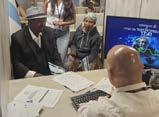




BY HOWARD FLOWER, ICEJ ALIYAH DIRECTOR
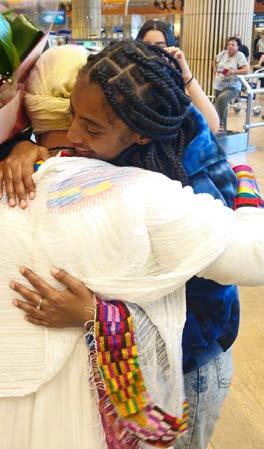
Recently, Ben Gurion Airport bore witness again to one of the most remarkable chapters in modern Jewish history— the ongoing ingathering of Ethiopian Jewry to the land of Israel. As another group of Olim (new immigrants) from Ethiopia descended the airplane steps and entered the arrival halls, they carried with them not just their modest belongings, but centuries of faith preserved against all odds.
Among the Olim who recently made Aliyah was Dr. Sarah, whose story encapsulates both the triumph and tragedy of Ethiopian Jewry's long exile. Dr. Sarah had been separated from her mother, Tadla, as an infant over 20 years ago when poverty forced an impossible choice upon a desperate parent, Sarah was raised by an adoptive family. Yet even as she pursued her medical studies, the dream of reuniting with her birth mother—and her people—never dimmed.
The moment when mother and daughter embraced in the arrival hall, Tadla, in her traditional white cotton dress clutching roses, Sarah in modern attire befitting her professional status, represented more than a personal reunion. It symbolized the healing of a people long scattered, the fulfillment of ancient prophecies, and the unique role Israel plays as the one nation on earth committed to gathering in Jews from every corner of the globe.
Walking through the arrival area, one could observe the beautiful diversity of this Aliyah. Elderly women in traditional garb clutched small Israeli flags with weathered hands that had known decades of hardship. Young men in GAP hoodies and Nike sneakers scrolled through smartphones, already bridging two worlds. Children with braided hair and wide eyes passed under balloon arches of blue and white, perhaps not fully grasping that they were entering not as refugees seeking charity but as Jews returning home by right. These Jews arrived under the Law of Return as members of the Bnei Israel recognized by Israel and the rabbinate.
The administrative procedures—the computer terminals, the forms, the officials carefully documenting each arrival—might seem mundane to the casual observer. But for those of us who have followed this story over decades, we recognize these moments for what they are: the practical machinery of prophecy in motion. Each signature, each issued identity number, each “Welcome home” spoken in Hebrew transforms a narrative of exile into one of restoration.

What strikes me most powerfully about this recent Aliyah is how it demonstrates Israel’s unwavering commitment to the Law of Return, even in challenging times. While other nations debate immigration quotas and border walls, Israel continues to open her arms to Jews wherever they may be found. The Ministry of Aliyah and Integration banners, the celebratory decorations, the patient officials helping elderly Olim navigate unfamiliar technology all speak to a nation that views the ingathering of exiles not as a burden but as a sacred duty.
Dr. Sarah will soon begin intensive Hebrew studies at Ulpan Etzion in Jerusalem, preparing for her medical licensing exams. Her journey from abandoned infant to Israeli physician embodies the transformative power of Aliyah. Yet she is just one story among thousands—each family that passed through those arrival halls carries their own saga of faith maintained through centuries of isolation, of traditions preserved in Ethiopian villages far from the eyes of the world, of children who grew up singing of Jerusalem in languages their new neighbors have never heard.
As we watched the new Olim board buses bound for absorption centers, still clutching their small Israeli flags and welcome balloons, we were reminded of the words of the prophet Jeremiah: “They shall come with weeping, and with supplications will I lead them." The tears in that arrival hall—tears of reunion, of joy, of overwhelming emotion—bear witness to promises kept and prophecies fulfilled.
The Ethiopian Aliyah is far from complete. Thousands more wait in Addis Ababa and Gondar, maintaining their faith while hoping for the day when they, too, will board flights to Ben Gurion. Family members remain separated. Challenges of integration await. But what we recently witnessed reminds us that the story of the Jewish people remains one of return, restoration, and redemption.
Welcome home, Sarah. Welcome home to all who arrived this week. May your absorption be swift, your integration successful, and your children grow up in an Israel that continues to exemplify what it means to be a light unto the nations—a country that never forgets its scattered children, no matter how long or how far they have wandered.
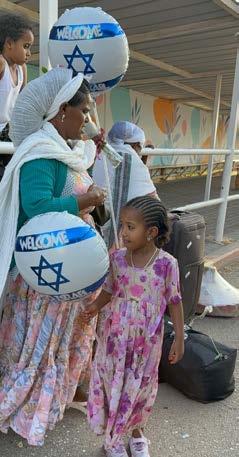

By Dr. Susan Michael, ICEJ USA President
Recent accusations that Israel is deliberately starving the people of Gaza by blocking humanitarian aid have spread quickly across headlines and social media. Not surprisingly, the world promptly embraced yet another narrative painting Israel as the villain.
But are these claims grounded in fact?
What Is Causing the Problem of Aid to Gaza?
Once aid from international sources has been acquired, it is loaded onto trucks and carried to tightly controlled border crossings. Israel then facilitates the entry of aid into Gaza, where the food and medical supplies are then picked up by UNRWA and other UN agencies for distribution. But these agencies often coordinate with Hamas, which regularly seizes the aid for its fighters or black-market sales, or the supplies are hijacked by powerful tribal families who take it for themselves, depleting the supply for civilians. If aid is not getting to people, the problem does not begin with Israel, but with who controls its distribution once in Gaza.
The Gaza Humanitarian Foundation (GHF)
To cut Hamas and tribal families out of the aid food chain and help food actually reach vulnerable Palestinians, the United States and Israel backed a private initiative in 2025 called the Gaza Humanitarian Foundation (GHF). This foundation was created as an alternative to the United Nations with the goal of bypassing Hamas/UN systems and delivering food more directly to those who need it most.
In addition to the tons of aid entering Gaza by truck, starting this past July, Israel— in coordination with the United States, Jordan, and the UAE—has airdropped aid at gathering points at specific times, to which civilians have been alerted.
As soon as the GHF food distribution program was announced, a plethora of international and humanitarian organizations began to call for it to be shutdown. The outcry was so immediate that it was clear the opposition was not about anything GHF had done but its intention to bypass the UN channels controlled by Hamas and provide food directly to the people. Over the next three months, GHF had distributed 100 million meals under the protection of the IDF; however, they were accused of distributing food in active combat areas due to the IDF presence, which was there for protection, and for not distributing enough food since they were operating in the IDF-controlled south while many Gazans were in Hamascontrolled Gaza City.
The United Nations has consistently been a mouthpiece for Hamas and misrepresented GHF’s work and denied its aid contributions. Positive reports have been buried, while adverse reports have dominated the news. These recent accusations are yet another example of selective reporting, which has created an illusion that Israel is withholding aid to Gaza and starving its people.
Even GHF humanitarian staff, including Christian workers, have been harassed or blocked, and there is evidence that the United Nations has minimized or undercounted shipments and shifted metrics, like what counts as “aid trucks,” to fit their narrative of lack.
And not surprisingly, the UN and Hamas began circulating stories of hundreds killed or injured from being crushed by the Israeli airdrops or of civilians being shot near GHF distribution sites. In reality, the number killed is grossly inflated. In one instance, a parachute failed to
deploy correctly, causing a pallet of aid to fall onto a group of people waiting for supplies. Though the loss of life is terrible, the number was nowhere near the hundreds as claimed
Not only are Hamas terrorists part of the United Nations, but some are journalists with Arab media and have had great influence. Their narrative that Israel is starving Gazans has been embraced and amplified by mainstream media. Consider the widely circulated photographs of an emaciated Palestinian boy—images published by the New York Post and echoed in outlets around the world. In truth, the boy had a preexisting condition that contributed to his gaunt look. (Israel had even transported the boy to Italy to receive care.) Many other examples of images in newspapers and on magazine covers show what appear to be starving families and children. In actuality, those images are staged, but by the time they circulate in the media, the damage is done. Israel is seen as the evil oppressor holding back food and aid to innocent people.
The humanitarian aid situation in Gaza is a genuine concern. But there is a disparity between public statements about the aid and the actual situation. The problem lies with Hamas, UN mismanagement, and corrupt family clans. It’s the same old story of Hamas and the UN manufacturing, politicizing, or magnifying what’s really happening in Gaza to fit a narrative of Israel as the bully.
Behind the images and false storyline that Israel is starving Gaza is a carefully constructed propaganda campaign that twists the truth, manipulates data, and redirects responsibility away from who is truly causing the suffering.

GARDEN FLAG
"Pray for the Peace of Jerusalem"
12" x 18" flag made of polyester fabric. Sold without flagpole. $10.00*



CAR MAGNET
Show your support for Israel with this car magnet. $2.50*
MEZUZAH
Brass colored with grafted-in symbol.
$15.00

*PLUS SHIPPING


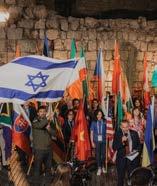

Basic Package
$50 USD

Full Online access to the 5-day Feast gathering accessible until the end of
Resource Package
$120 USD
• Basic Package items (Videos on Demand accessible until end of July 2026)
• Plus the following resources:
- Feast T-shirt merchandise*
- ICEJ 2026 Calendar*
*Free Shipping included for the Feast merchandise
First-Fruit Package $170 USD
Upgrade to a First-Fruit package and bless Israel with your Feast offering of $50 USD
Upgrade of Online Resource Package

For more information visit
www.icejusa.org/feast-2025-online or email events@icej.org